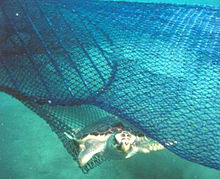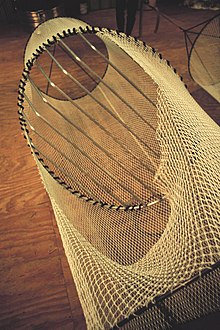Turtle excluder device
[5] In 1996, the government of India proposed legislation for the requirement of modified "indigenous" TEDs, which they called TSDs (turtle saving devices), to be used by local fishermen.This resulted in the increase of the distance between each pair of bars to ensure that bigger specimens of shrimp and fish were able to pass through the TSD and into the net.The tie is removed when the vessel returns to port, thus avoiding detection by enforcement officers, but placing turtles at risk while trawling.For example, in September 2008 following Hurricanes Gustav and Ike, the National Marine Fisheries Service (NMFS) allowed temporary use of "Tow Times" in lieu of TEDs.[15] The TTED reduces sorting time and risks of injury due to sharks and rays being caught, improves the quality of shrimps, which are less likely to be crushed in the bottom of the trawl, and may also lead to a reduction in the amount of fuel consumed by the boats.[16] With technical support from NOAA and IFREMER, the CRPMEMG carried out numerous at sea trials in close collaboration with French Guiana fleets.These trials allowed the fleets and the crews on board the shrimp trawlers to understand the advantages of more selective fishing gear and the benefits of using it in French Guiana.Based on the results and the captains' recommendations, the CRPMEMG decided to make the use of this TTED system mandatory by January 2010, when the annual fishing licences are issued.



Loggerhead turtlefishing netsea turtlebottom trawlingshrimp fishing industryshrimptrawl netbycatchshrimp-turtle lawolive ridleyOdishaloggerheadsleatherbackstrawlerGulf of MexicoNational Marine Fisheries ServiceIFREMERtechnical supportFrench GuianaMammals and birds excluder deviceNational Oceanic and Atmospheric AdministrationCultural depictions of turtlesfictional turtlesTurtle farmingTurtle Island (Native American folklore)Turtle racingTurtle soupTurtle steakTurtlingWorld turtleFisheryFisheries sciencewild fisheriesFisheriessciencePopulation dynamics of fisheriesShifting baselineFish stockFish mortalityCondition indexStock assessmentFish measurementStandard weight in fishFish counterData storage tagCatch per unit effortOtolith microchemical analysisBiomassFisheries acousticsAcoustic tagCoded wire tagGIS and aquatic sciencePop-up satellite archival tagEcoSCOPEAge class structureTrophic levelTrophic cascadesHydrographic containmentMatch/mismatch hypothesisClimate change and fisheriesMarine biologyAquatic ecosystemsBioeconomicsEconMultEcopathFishBaseCensus of Marine LifeOSTM/Jason-2WildfisheriesOcean fisheriesDiversity of fishCoastal fishCoral reef fishDemersal fishForage fishPelagic fishCod fisheriesCrab fisheriesEel fisheriesKrill fisheriesLobster fisheriesShrimp fisheryEel ladderFish ladderFish screenMigrationSalmon runSardine runShoaling and schoolingMarine habitatMarine snowWater columnUpwellingHumboldt currentAlgal bloomsDead zonesFish killFisheries lawmanagementsustainabilityconservationExclusive economic zoneIllegal, unreported and unregulated fishingUnited Nations Convention on the Law of the SeaUnited Nations Fish Stocks AgreementFisheries ConventionMagnuson–Stevens ActFisheries managementMonitoring control and surveillanceVessel monitoring systemFishery Resources Monitoring SystemCatch reportingFisheries observerCatch shareIndividual fishing quotaMinimum landing sizePulse fishingSlot limitEU Common Fisheries PolicyEU MLSEuropean Fisheries Control AgencyRegional fishery bodyRegional fishery management organisationSustainable fisheryMaximum sustainable yieldList of commercially important fish speciesSustainable seafood